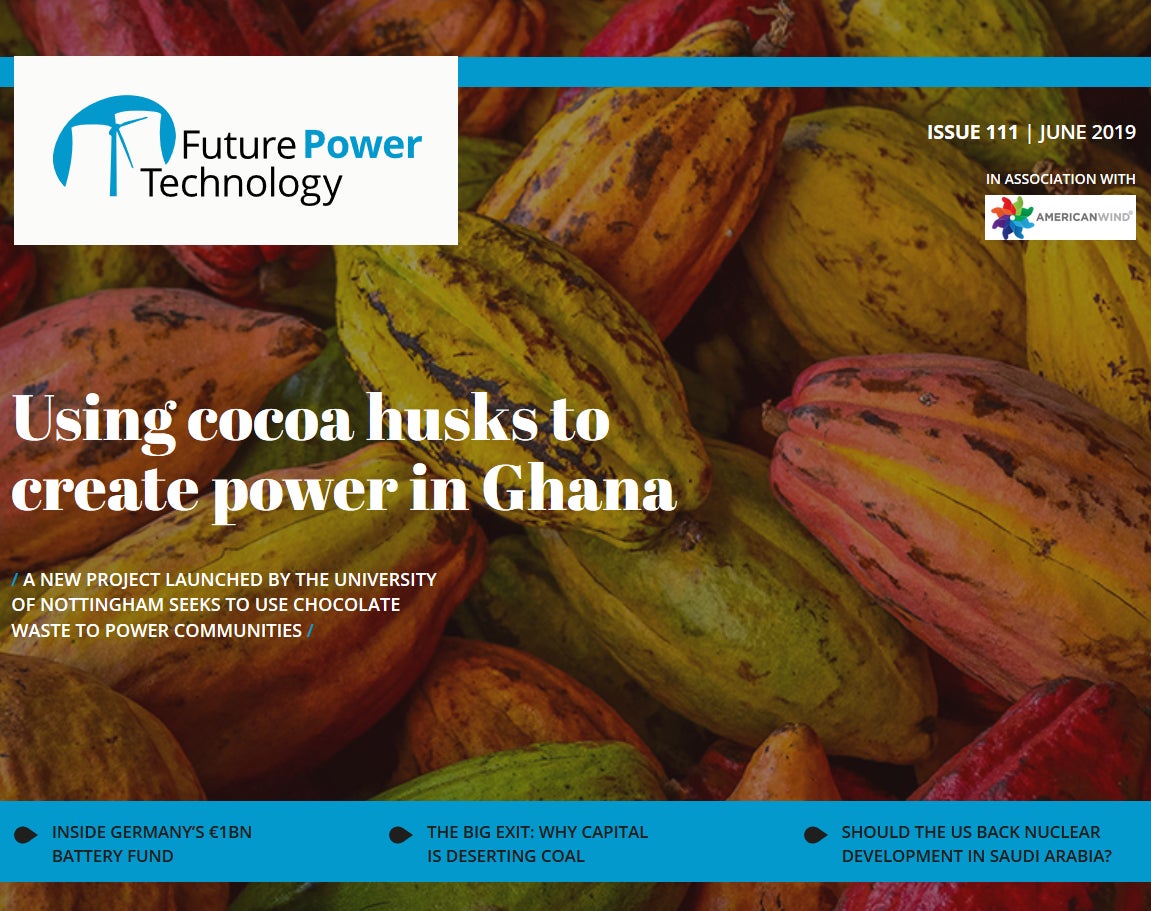
Future Power Technology is back for another issue packed with industry news and analysis. You can read the magazine for free online on any desktop, laptop, tablet or smartphone. If you’d like to be notified by email when a new issue is available, simply sign up here.
As the Trump administration explores the possibility of selling US technology to Saudi Arabia, we look at the kingdom’s civil nuclear push and its potential routes for development.

Discover B2B Marketing That Performs
Combine business intelligence and editorial excellence to reach engaged professionals across 36 leading media platforms.
We also review the ‘US Energy and Employment Report 2019’ to find out how job opportunities in the energy industry are growing and who is most in demand.
In the UK, we check in on plans to get 30% of its electricity from wind power by 2030, new efforts to upgrade the transmission and distribution system using Edinburgh-based start-up Faraday Grid’s smart power management, and a project led by the University of Nottingham, which is hoping to spark a brand new biofuel industry in Ghana.
Also in this issue, we look into Germany’s $1.1bn fund to support battery production, explore research from the IEEFA which has shown that the rate of lenders exiting coal has accelerated of over one per month, and speak to SOS Intl and WSC about the first power industry simulator designed to train distribution system operators to perform normal and emergency tasks.
In this issue
Nuclear development in Saudi Arabia: should the US back it?

US Tariffs are shifting - will you react or anticipate?
Don’t let policy changes catch you off guard. Stay proactive with real-time data and expert analysis.
By GlobalDataThe kingdom of Saudi Arabia’s long-held ambitions for civil nuclear power have hit the headlines again, partly due to the trump administration’s support. If the kingdom is to succeed, it first has to accept its international obligations, including IAEA monitoring. Andrew Tunnicliffe explores the challenges involved in the process.
What is the best energy sector to work in?
The fourth annual US Energy and Employment Report (USEER) analyses the country’s energy workforce by sector. JP Casey takes a look at each sector to find out where the hiring issues are and where the best opportunities lie.
Is the UK’s new wind a breath of fresh air, or the same old hot air?
A new deal between the UK government and the wind industry sets out to ensure that 30% of the country’s electricity will come from wind power by 2030 – but will it be enough and why does it only cover offshore? Julian Turner finds out.
Using cocoa husks to create power in Ghana
A unique way of creating energy from cocoa bean husks is being developed in ghana as part of a project led by the UK’s University of Nottingham. Jack Unwin finds out how this project could help Ghana to achieve its target of universal electricity access by 2030.
Inside Germany’s €1 billion battery fund
The German government has earmarked around €1bn to support battery cell production at home and in Europe as part of a bold bid to take 30% of global market share by 2030. But can the investment successfully wrestle production away from dominant Asian competitors? Heidi Vella finds out.
The big exit: why capital is deserting coal
As more and more funds pull out of coal, Andrew Tunnicliffe talks with the IEEFA’s Tim Buckley about what’s leading the exodus and what it means for the future of coal.
Talking energy modernisation with the UK’s faraday grid
The UK’s electricity grid has barely changed technologically since it was built over a century ago. How can the grid cope and adapt to the challenges of the 21st presents? Jack Unwin finds out from Matthew Williams, founder of Faraday grid, how its technology will lead to automation and decentralisation of the UK grid.
Power simulation: training distribution system operators
Distribution systems operators are often undertrained but the launch of a new power industry simulator, designed to replicate emergency scenarios, could make training much more realistic and relevant. Ross Davies spoke to Rocky Sease, CEO of one of the companies behind the tool.
Next issue
Many targets have been set, and many predictions made, but what really needs to be done for the world to transition entirely to renewable energy systems? We take a look at the technologies that will pave the way for a cleaner energy future.
As the UK increasingly embraces renewables, it is moving away from coal for good. We profile the seven remaining coal plants in the country.
Solar panels are one of the most popular and successful forms of renewables. We take a look at the efforts to balance efficiency and cost in various types of solar cells.
Hydropower has come under criticism following a report produced by the World Bank showing that the technology hold back nations. Should countries steer clear of the power source? New technologies and solutions are constantly being developed though, and the Start-Up Energy Transition (SET) initiative has produced a list of the top 100.
Finally, we look at the nuclear renationalisation debate in France, the UK’s failing power companies and what can be done about them, and how the energy recruitment sector is powering up.





